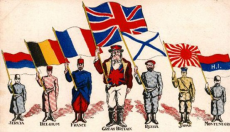
Email: ZYVC057@live.rhul.ac.uk
Total Article : 213
About Me:I'm a graduate student studying International Criminal Law and first started writing for King's News almost 4 years ago! My hobbies include reading, travelling and charity work. I cover many categories but my favourite articles to write are about mysteries of the ancient world, interesting places to visit, the Italian language and animals!

With the advent of globalisation, the liberalisation of the international market and the emergence of more prominent international bodies, states no longer have to focus solely on the threat of military confrontation. Instead, warfare itself has been drastically internationalised and as a result scholars have argued that the entire spectrum of security studies – which is largely state-centric - should be widened to accommodate such changes.
When security studies were first founded, their primary aim was to solve issues related to state security and they mainly focused on military threats. This approach later became known as the state-centric theory as it revolves around the concept of statism, meaning it relates all issues back to the state. Its influences are strongly embedded in the realist perspective which poses state sovereignty as a core issue and regards the international system as a theatre of anarchy where states battle for the ultimate acquisition of power, which then leads to their own security. Indeed the struggle is based on a fight for survival in which each state places its own interests first.
When confronted with the growing importance of globalisation, realist Kenneth Waltz claimed that ‘globalisation is a fad of the 1990s’ (Waltz 1999: 2) and that no non-state actor with the same importance as a state actor exists. In recent decades there has been a growth in the establishment of transnational organised crime which can be defined as ‘self-perpetuating associations operating across national borders that use violence and corruption, and exploit transnational commerce and communications, to protect and disguise their illicit, profit-driven activities’. From the perspective of the state-centric theory, transnational organised crime (TOC) cannot be a valid threat to the international system which is composed of state actors. Instead, TOC is perceived as a marginal threat as it is illegitimate and as such should not be included in the discussion of international security (Zabyelina 2009: 17). If state-centric security adopts this approach, non-state security issues like transnational organisational crimes are dismissed as a challenge to the international system when in reality they are fearful forces which can shatter the global arena of inter-state politics.
The state-centric theory of security is fuelled by a fervent sense of nationalism yet TOC manifests itself on an international level. It incorporates international economics, new non-state actors – which can form sects such as the Triad or Snakeheads - and global crimes. It involves internationalised acts of drug trafficking, globalised mafia-related issues, terrorism and economic fraud along with other human rights abuses such as modern slavery, human trafficking and war crimes. According to studies, the number of illicit financial flows has risen to over $600 billion per year (Berdal and Serrano 2002: 2) whilst non-state actors form intricately complicated webs of communication, making it hard for a single state to target such a globally dispersed organisation.
A number of international, as well as regional and national, bodies have recently emerged to tackle specific areas of TOC. Many may consider this to be a liberal prophecy in the makings as states are being forced to turn to these bodies, such as the UN, for support and permission to take necessary actions. Once state-centric theorists are confronted with such ongoing international emergencies the entire concept of statism takes a backseat as the internationalised realm of organised crime sweeps from state to state without significant hurdles. Indeed states can no longer be held responsible for maintaining order as all concepts of state boundaries are disregarded when it comes to confronting the global crime.
Image: http://www.metanexus.net/sites/default/files/styles/page_main/public/nationalism.jpg?itok=AGY92xHZ

0 Comment:
Be the first one to comment on this article.